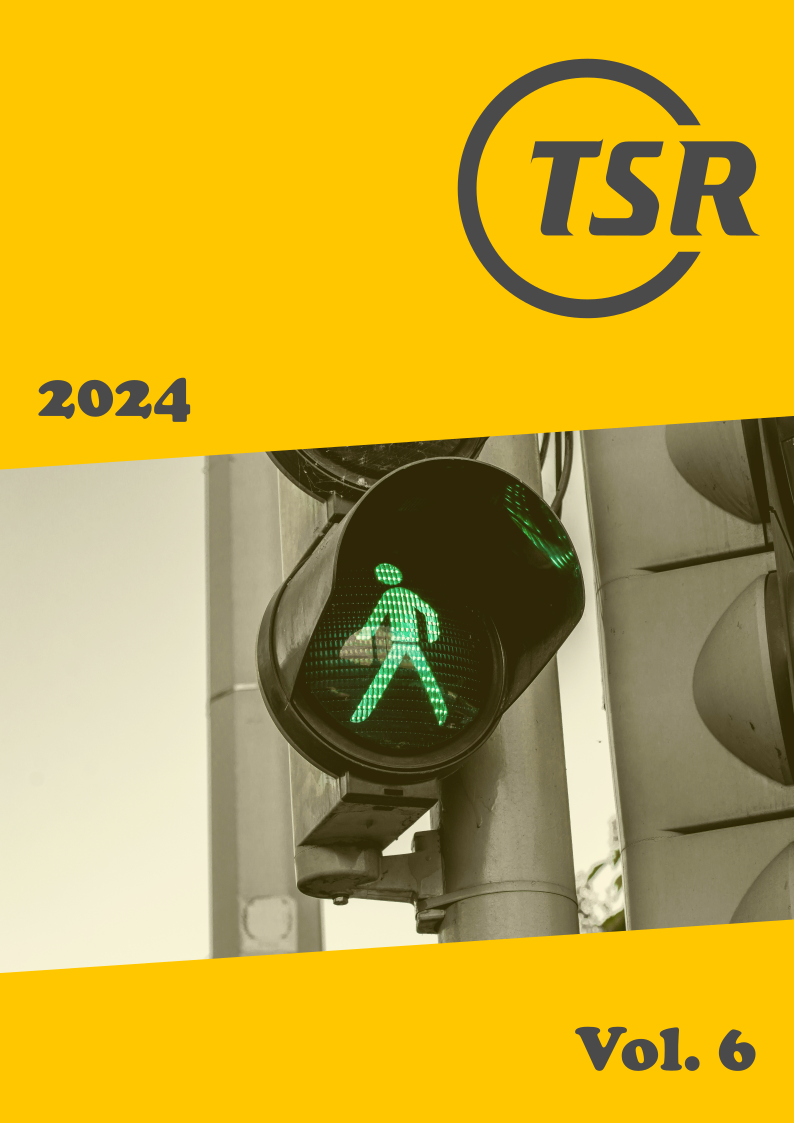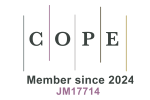Exploring the relationship between traffic resilience and driver behaviors through traffic climate
DOI:
https://doi.org/10.55329/trjs3850Keywords:
driver behaviors, traffic climate, traffic resilienceAbstract
Traffic safety culture and climate have emerged as an integral part of road safety policy and practice in recent decades, resulting in an emphasis on a holistic approach to road safety through systems thinking. The aim of this study was to investigate the relationship between drivers' perceptions of traffic resilience and traffic climate and their impact on driver behaviors. A total of 216 drivers aged between 19 and 32 years completed an online questionnaire consisting of the Traffic Resilience Scale (TRS), the Traffic Climate Scale (TCS), the Driver Behavior Questionnaire (DBQ), and the Positive Driver Behaviors Scale (PDBS). Serial mediation analyses were conducted to examine the objectives of the study. The results showed that drivers who perceived the traffic system as more resilient tended to perceive the traffic system as more functional and less externally demanding. The drivers' perceptions of traffic resilience were found to be directly related to the traffic climate and indirectly related to the driver behaviors through external affective demands and internal requirements. Increased traffic resilience was associated with increased aberrant behaviors and decreased positive behaviors through reduced external affective demands and internal requirements. These findings can be considered to make a unique contribution to the literature in understanding the motivations behind aberrant behaviors of drivers and highlight the need for road safety policies to take into account road users' perceptions of traffic resilience and traffic climate in order to better understand, predict, and modify road user behaviors for a safer traffic system.
Downloads
References
Afrin, T., N. Yodo (2020), 'A survey of road traffic congestion measures towards a sustainable and resilient transportation system', Sustainability, 12(11), 4660. DOI: https://doi.org/10.3390/su12114660
Atombo, C., C. Wu (2022), 'Traffic safety climate factors in explaining driving behaviours and traffic crash involvement: Comparative study among male and female drivers', Journal of Road Safety, 33(1), 49–62. DOI: https://doi.org/10.33492/JRS-D-21-00036
Benzaman, B., N. J. Ward, W. J. Schell (2022), 'The influence of inferred traffic safety culture on traffic safety performance in U.S. States (1994–2014)', Journal of Safety Research, 80, 311–319. DOI: https://doi.org/10.1016/j.jsr.2021.12.014
Calvert, S. C., M. Snelder (2018), 'A methodology for road traffic resilience analysis and review of related concepts', Transportmetrica A: Transport Science, 14(1-2), 130–154. DOI: https://doi.org/10.1080/23249935.2017.1363315
Chou, C.-C., K. Yoh, H. Inoi, T. Yamaguchi, K. Doi (2022), 'Effectiveness evaluation on cross-sector collaborative education programs for traffic safety toward sustainable motorcycle culture in Vietnam', IATSS Research, 46(2), 258–268. DOI: https://doi.org/10.1016/j.iatssr.2022.01.001
Chu, W., C. Wu, C. Atombo, H. Zhang, T. Özkan (2019), 'Traffic climate, driver behaviour, and accidents involvement in China', Accident Analysis & Prevention, 122, 119–126. DOI: https://doi.org/10.1016/j.aap.2018.09.007
DeJoy, D. M. (1989), 'The optimism bias and traffic accident risk perception', Accident Analysis & Prevention, 21(4), 333–340. DOI: https://doi.org/10.1016/0001-4575(89)90024-9
Dhibi, M., W. Alhajyaseen, N. Alinier (2022), 'Safety and security perceptions in informal transport: the case of Tunisia', International Journal of Injury Control and Safety Promotion, 30(1), 45–56. DOI: https://doi.org/10.1080/17457300.2022.2109679
Edwards, J., J. Freeman, D. Soole, B. Watson (2014), 'A framework for conceptualising traffic safety culture', Transportation Research Part F: Traffic Psychology and Behaviour, 26, 293–302. DOI: https://doi.org/10.1016/j.trf.2014.03.002
Feng, Z., N. Ji, Y. Luo, N. N. Sze, J. Tian, C. Zhao (2021), 'Exploring the influencing factors of public traffic safety awareness in China', Cognition, Technology & Work, 23, 731–742. DOI: https://doi.org/10.1007/s10111-020-00655-8
Gehlert, T., C. Hagemeister, T. Özkan (2014), 'Traffic safety climate attitudes of road users in Germany', Transportation Research Part F: Traffic Psychology and Behaviour, 26, 326–336. DOI: https://doi.org/10.1016/j.trf.2013.12.011
Güner, G., E. Tümer, I. Öztürk, B. Öz (2019), 'Does traffic safety climate perception of drivers differ depending on their traffic system resilience and driving skills evaluation?', in Bagnara, S., R. Tartaglia, S. Albolino, T. Alexander, Y. Fujita (eds.), 20th Congress of the International Ergonomics Association (IEA 2018), Florence, Italy, 26–30 August. DOI: https://doi.org/10.1007/978-3-319-96068-5_80
Hayes, A. F. (2022), Introduction to mediation, moderation, and conditional process analysis: A regression-based approach, (New York, US: Guilford Press).
Morimoto, A., A. Wang, N. Kitano (2022), 'A conceptual framework for road traffic safety considering differences in traffic culture through international comparison', IATSS Research, 46(1), 3–13. DOI: https://doi.org/10.1016/j.iatssr.2021.11.012
Nævestad, T. O., A. Laiou, R. O. Phillips, T. Bjørnskau, G. Yannis (2019), 'Safety culture among private and professional drivers in Norway and Greece: Examining the influence of national road safety culture', Safety, 5(2), 20. DOI: https://doi.org/10.3390/safety5020020
Nævestad, T. O., A. Laiou, G. Yannis (2020), 'Safety culture among car drivers and motorcycle riders in Norway and Greece: Examining the influence of nationality, region, and transport mode', Frontiers in Sustainable Cities, 2, 23. DOI: https://doi.org/10.3389/frsc.2020.00023
Nævestad, T. O., A. Laiou, G. Yannis (2022), 'The role of values in road safety culture: Examining the relationship between valuation of freedom to take risk and accident risk among motorcycle riders and car drivers', Traffic Safety Research, 3, 000010. DOI: https://doi.org/10.55329/ggnj7534
Nævestad, T.-O., V. Milch (2023), 'Traffic Safe Municipality: A Norwegian approval scheme to facilitate development of a municipal traffic safety culture', Traffic Safety Research, 5, 000025. DOI: https://doi.org/10.55329/pbmy3871
Nakamura, H., A. Morimoto (2022), 'Road safety and traffic culture from an international perspective', IATSS Research, 46(1), 1–2. DOI: https://doi.org/10.1016/j.iatssr.2022.03.005
Nogal, M., D. Honfi (2019), 'Assessment of road traffic resilience assuming stochastic user behaviour', Reliability Engineering & System Safety, 185, 72–83. DOI: https://doi.org/10.1016/j.ress.2018.12.013
Omidi, L., S. Mousavi, G. Moradi, F. Taheri (2022), 'Traffic climate, driver behaviour and dangerous driving among taxi drivers', International Journal of Occupational Safety and Ergonomics, 28(3), 1482–1489. DOI: https://doi.org/10.1080/10803548.2021.1903705
Özkan, T., T. Lajunen (2015), 'A General Traffic (Safety) Culture System (G-TraSaCu-S)', TraSaCu Project, Deliverable D2.1.
Özkan, T., T. Lajunen (2005), 'A new addition to DBQ: Positive driver behaviours scale', Transportation Research Part F: Traffic Psychology and Behaviour, 8(4-5), 355–368. DOI: https://doi.org/10.1016/j.trf.2005.04.018
Özkan, T., T. Lajunen (2011), 'Person and environment: Traffic culture', Handbook of Traffic Psychology, 179–192. DOI: https://doi.org/10.1016/B978-0-12-381984-0.10014-1
Öztürk, I., H. Wallén Warner, T. Özkan (2023), 'Automation preferences by traffic climate and driver skills in two samples from countries with different levels of traffic safety', Transportation Research Record, 2677(2), 1701–1712. DOI: https://doi.org/10.1177/03611981221109593
Reason, J., A. Manstead, S. Stradling, J. Baxter, K. Campbell (1990), 'Errors and violations on the roads: a real distinction?', Ergonomics, 33(10-11), 1315–1332. DOI: https://doi.org/10.1080/00140139008925335
Rockefeller Foundation, (2023), '100 Resilient Cities', The Rockefeller Foundation.
Stringer, R. J. (2018), 'Exploring traffic safety culture and drunk driving: An examination of the community and DUI related fatal crashes in the US (1993–2015)', Transportation Research Part F: Traffic Psychology and Behaviour, 56, 371–380. DOI: https://doi.org/10.1016/j.trf.2018.05.014
Türkiye Istatistik Kurumu, (2019), 'Karayolu trafik kaza istatistikleri, 2018 [Road traffic accident statistics, 2018]', Türkiye Istatistik Kurumu.
Üzümcüoglu, Y., Ö. Ersan, B. Kaçan, G. Solmazer, D. Azik, G. Findik, T. Özkan, T. Lajunen, B. Öz, A. Pashkevich, M. Pashkevich, V. Danelli-Mylona, D. Georgogianni, E. B. Krasniqi, E. Makris, K. Shubenkova, G. Xheladini (2020), 'A short scale of traffic climate across five countries', Mustafa Kemal University Journal of Social Sciences Institute, 17(46), 673–702.
Üzümcüoglu, Y., T. Özkan, C. Wu, H. Zhang (2020), 'Traffic climate and driver behaviors: The moderating role of driving skills in Turkey and China', Journal of Safety Research, 75, 87–98. DOI: https://doi.org/10.1016/j.jsr.2020.08.004
Wang, C., C. Xu, J. Xia, Z. Qian (2018), 'The effects of safety knowledge and psychological factors on self-reported risky driving behaviors including group violations for e-bike riders in China', Transportation Research Part F: Traffic Psychology and Behaviour, 56, 344–353. DOI: https://doi.org/10.1016/j.trf.2018.05.004
Ward, N. J., K. Finley, J. Otto, D. Kack, R. Gleason, T. Lonsdale (2020), 'Traffic safety culture and prosocial driver behavior for safer vehicle-bicyclist interactions', Journal of Safety Research, 75, 24–31. DOI: https://doi.org/10.1016/j.jsr.2020.07.003
White, M. J., L. C. Cunningham, K. Titchener (2011), 'Young drivers’ optimism bias for accident risk and driving skill: Accountability and insight experience manipulations', Accident Analysis & Prevention, 43(4), 1309–1315. DOI: https://doi.org/10.1016/j.aap.2011.01.013
WHO, (2018), 'Global status report on road safety 2018', World Health Organization, 9789241565684.
Yilmaz, S., B. Arslan, I. Öztürk, Ö. Özkan, T. Özkan, T. Lajunen (2022), 'Driver social desirability scale: A Turkish adaptation and examination in the driving context', Transportation Research Part F: Traffic Psychology and Behaviour, 84, 53–64. DOI: https://doi.org/10.1016/j.trf.2021.11.009
Published
How to Cite
Issue
Section
License
Copyright (c) 2024 İbrahim Öztürk, Ece Tümer, Bahar Öz

This work is licensed under a Creative Commons Attribution 4.0 International License.










